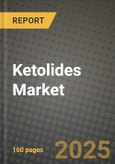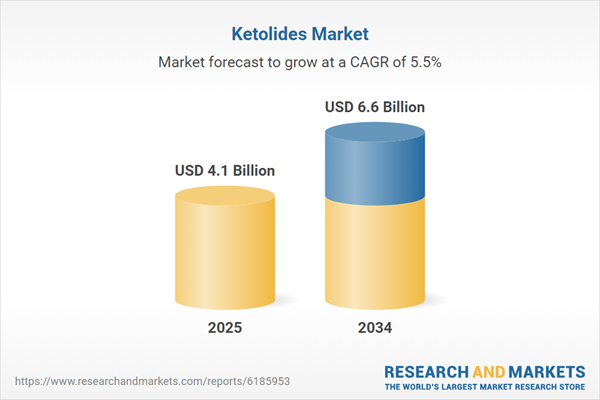The Ketolides Market comprises a class of antibiotics structurally related to macrolides, used primarily to treat respiratory tract infections caused by drug-resistant bacteria. Ketolides - like telithromycin - are designed to overcome resistance mechanisms seen in common pathogens such as *Streptococcus pneumoniae* and *Haemophilus influenzae*. These antibiotics exhibit broad-spectrum activity and are often reserved for cases where traditional antibiotics fail. With rising antimicrobial resistance (AMR) becoming a global health concern, ketolides play a crucial role in the pharmaceutical pipeline for treating community-acquired pneumonia and other infections. The market includes branded formulations, generics, and ongoing clinical research into next-generation derivatives with enhanced safety and efficacy profiles.
The ketolides market remained a small but vital segment of the global antibiotics landscape. Increased incidence of macrolide-resistant bacterial infections led healthcare providers to re-evaluate ketolide prescriptions in specific patient populations. Pharmaceutical companies continued to invest in next-gen ketolides with improved liver safety profiles, as past concerns - especially with telithromycin - limited broader adoption. Regulatory agencies revisited risk-benefit assessments, prompting label revisions and post-marketing surveillance. Emerging economies, particularly in Southeast Asia and Latin America, increased imports of ketolide antibiotics amid growing hospital-acquired infection rates. Research institutions also explored combination therapies pairing ketolides with beta-lactams or immunomodulators for enhanced clinical outcomes.
The ketolides market is expected to evolve as antimicrobial stewardship programs push for targeted use of potent antibiotics. Investment in R&D will yield safer ketolide derivatives with improved pharmacokinetics and reduced hepatotoxicity. Strategic partnerships between biotech firms and academic institutions will explore novel ketolide mechanisms for multi-drug resistant pathogens. Hospital formularies and infectious disease guidelines may increasingly endorse ketolides in specific resistant infection protocols. However, regulatory oversight will remain strict, requiring robust clinical data and post-marketing vigilance. As global pressure mounts to address AMR, ketolides will occupy a niche but indispensable role in next-generation antibiotic stewardship strategies.
Key Insights: Ketolides Market
- The analyst highlights renewed interest in next-generation ketolides with improved safety profiles as pharmaceutical companies seek to address the limitations of earlier compounds like telithromycin.
- Use of ketolides in combination therapies is trending, particularly in hospital settings, where they are paired with beta-lactams or immunomodulators to combat multi-drug resistant infections.
- According to the analyst, antimicrobial stewardship programs are trending globally, encouraging judicious use of ketolides as part of precision therapy in respiratory and critical care infections.
- Expansion of ketolide supply chains in emerging markets is trending as these regions face rising rates of antibiotic resistance and limited access to newer-generation drugs.
- Collaborative antibiotic R&D models involving biotech startups and academic centers are trending, supporting the development of safer and more targeted ketolide derivatives.
- The analyst identifies rising antibiotic resistance among common pathogens as a key driver compelling healthcare systems to revisit ketolides for targeted, last-line antibiotic therapy.
- Continued demand for effective treatments for community-acquired pneumonia and macrolide-resistant infections is sustaining ketolide use in respiratory care protocols, says the analyst.
- The analyst notes that government-backed AMR action plans and global health partnerships are supporting R&D and access to potent but underutilized antibiotic classes like ketolides.
- Increased investment in clinical research aimed at improving drug tolerability and reducing adverse effects is driving pharmaceutical interest in ketolide derivatives.
- The analyst highlights persistent concerns over hepatotoxicity and side effects from first-generation ketolides, which continue to limit physician confidence and broad-spectrum usage.
- According to the analyst, stringent regulatory hurdles and high development costs in antibiotic R&D create significant barriers for market entry and widespread commercialization of new ketolides.
Ketolides Market Segmentation
By Drug Type
- Telithromycin
- Cethromycin
- Solithromycin
By Indication
- Bronchitis
- Pneumonia
- Sinusitis
- Tonsillitis Or Pharyngitis
By Microorganism
- Streptococcus Pneumoniae
- Haemophilus Influenzae
- Moraxella Catarrhalis
- Chlamydophila Pneumoniae
- Mycoplasma Pneumoniae
By Distribution Channel
- Hospital Pharmacies
- Retail Pharmacies
- Online Pharmacies
- Other Distribution Channels
Key Companies Analysed
- Pfizer Inc.
- F. Hoffmann-La Roche Ltd.
- Merck & Co. Inc.
- Bayer AG
- Novartis AG
- Sanofi S.A.
- Bristol-Myers Squibb Company
- AstraZeneca PLC
- Abbott Laboratories
- GSK PLC
- Takeda Pharmaceutical Company Limited
- Eli Lilly and Company
- Teva Pharmaceutical Industries Ltd.
- Astellas Pharma Inc.
- Daiichi Sankyo Company Limited
- Shionogi & Company Limited
- Dr. Reddys Laboratories Ltd.
- Taisho Pharmaceutical Co. Ltd.
- Glenmark Pharmaceuticals Ltd.
- Zhejiang Yongtai Technology Co. Ltd.
- Corden Pharma GmbH
- Optimer Pharmaceuticals Inc.
- Vivimed Labs Limited
- Wockhardt Ltd.
- Advanced Life Sciences Holdings Inc.
Ketolides Market Analytics
The report employs rigorous tools, including Porter’s Five Forces, value chain mapping, and scenario-based modeling, to assess supply-demand dynamics. Cross-sector influences from parent, derived, and substitute markets are evaluated to identify risks and opportunities. Trade and pricing analytics provide an up-to-date view of international flows, including leading exporters, importers, and regional price trends.Macroeconomic indicators, policy frameworks such as carbon pricing and energy security strategies, and evolving consumer behavior are considered in forecasting scenarios. Recent deal flows, partnerships, and technology innovations are incorporated to assess their impact on future market performance.
Ketolides Market Competitive Intelligence
The competitive landscape is mapped through proprietary frameworks, profiling leading companies with details on business models, product portfolios, financial performance, and strategic initiatives. Key developments such as mergers & acquisitions, technology collaborations, investment inflows, and regional expansions are analyzed for their competitive impact. The report also identifies emerging players and innovative startups contributing to market disruption.Regional insights highlight the most promising investment destinations, regulatory landscapes, and evolving partnerships across energy and industrial corridors.
Countries Covered
- North America - Ketolides market data and outlook to 2034
- United States
- Canada
- Mexico
- Europe - Ketolides market data and outlook to 2034
- Germany
- United Kingdom
- France
- Italy
- Spain
- BeNeLux
- Russia
- Sweden
- Asia-Pacific - Ketolides market data and outlook to 2034
- China
- Japan
- India
- South Korea
- Australia
- Indonesia
- Malaysia
- Vietnam
- Middle East and Africa - Ketolides market data and outlook to 2034
- Saudi Arabia
- South Africa
- Iran
- UAE
- Egypt
- South and Central America - Ketolides market data and outlook to 2034
- Brazil
- Argentina
- Chile
- Peru
Research Methodology
This study combines primary inputs from industry experts across the Ketolides value chain with secondary data from associations, government publications, trade databases, and company disclosures. Proprietary modeling techniques, including data triangulation, statistical correlation, and scenario planning, are applied to deliver reliable market sizing and forecasting.Key Questions Addressed
- What is the current and forecast market size of the Ketolides industry at global, regional, and country levels?
- Which types, applications, and technologies present the highest growth potential?
- How are supply chains adapting to geopolitical and economic shocks?
- What role do policy frameworks, trade flows, and sustainability targets play in shaping demand?
- Who are the leading players, and how are their strategies evolving in the face of global uncertainty?
- Which regional “hotspots” and customer segments will outpace the market, and what go-to-market and partnership models best support entry and expansion?
- Where are the most investable opportunities - across technology roadmaps, sustainability-linked innovation, and M&A - and what is the best segment to invest over the next 3-5 years?
Your Key Takeaways from the Ketolides Market Report
- Global Ketolides market size and growth projections (CAGR), 2024-2034
- Impact of Russia-Ukraine, Israel-Palestine, and Hamas conflicts on Ketolides trade, costs, and supply chains
- Ketolides market size, share, and outlook across 5 regions and 27 countries, 2023-2034
- Ketolides market size, CAGR, and market share of key products, applications, and end-user verticals, 2023-2034
- Short- and long-term Ketolides market trends, drivers, restraints, and opportunities
- Porter’s Five Forces analysis, technological developments, and Ketolides supply chain analysis
- Ketolides trade analysis, Ketolides market price analysis, and Ketolides supply/demand dynamics
- Profiles of 5 leading companies - overview, key strategies, financials, and products
- Latest Ketolides market news and developments
Additional Support
With the purchase of this report, you will receive:- An updated PDF report and an MS Excel data workbook containing all market tables and figures for easy analysis.
- 7-day post-sale analyst support for clarifications and in-scope supplementary data, ensuring the deliverable aligns precisely with your requirements.
- Complimentary report update to incorporate the latest available data and the impact of recent market developments.
This product will be delivered within 1-3 business days.
Table of Contents
Companies Mentioned
- Pfizer Inc.
- F. Hoffmann-La Roche Ltd.
- Merck & Co. Inc.
- Bayer AG
- Novartis AG
- Sanofi S.A.
- Bristol-Myers Squibb Company
- AstraZeneca PLC
- Abbott Laboratories
- GSK PLC
- Takeda Pharmaceutical Company Limited
- Eli Lilly and Company
- Teva Pharmaceutical Industries Ltd.
- Astellas Pharma Inc.
- Daiichi Sankyo Company Limited
- Shionogi & Company Limited
- Dr. Reddys Laboratories Ltd.
- Taisho Pharmaceutical Co. Ltd.
- Glenmark Pharmaceuticals Ltd.
- Zhejiang Yongtai Technology Co. Ltd.
- Corden Pharma GmbH
- Optimer Pharmaceuticals Inc.
- Vivimed Labs Limited
- Wockhardt Ltd.
- Advanced Life Sciences Holdings Inc.
Table Information
| Report Attribute | Details |
|---|---|
| No. of Pages | 160 |
| Published | October 2025 |
| Forecast Period | 2025 - 2034 |
| Estimated Market Value ( USD | $ 4.1 Billion |
| Forecasted Market Value ( USD | $ 6.6 Billion |
| Compound Annual Growth Rate | 5.4% |
| Regions Covered | Global |
| No. of Companies Mentioned | 25 |









